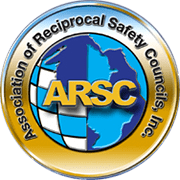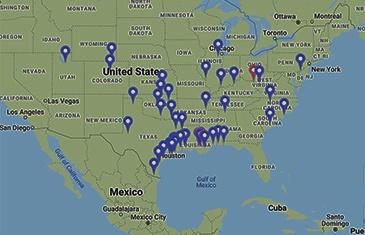ARSC Launches Reimagined Basic Orientation Plus® Refresher
ARSC is proud to announce the launch of the reimagined Basic Orientation Plus® Refresher (BOPR). The Reimagined BOPR follows the successful rollout of the BOP Reimagined foundational course. Together, the reimagined foundational and refresher courses create a cohesive, modern learning experience that meets the evolving needs of today’s industrial workforce – without compromising the consistency and legal defensibility the industry depends on.
What’s New for the Basic Orientation Plus® Refresher?
Interactive Design
The Reimagined Refresher moves beyond passive instruction, incorporating modern, interactive elements that actively engage participants from start to finish.
Scenario-Based Learning
Students are immersed in realistic, job-based scenarios that mirror real-world conditions. This approach strengthens critical thinking, reinforces hazard recognition, and supports sound decision-making on the job.
Graded Assessments Throughout
Built-in quizzes provide real-time feedback, while graded assessments throughout the course maintains the program’s strong legal defensibility.
Now Available at all ARSC Training Locations!
The Reimagined BOP Refresher is available now at all ARSC training locations. Select councils also provide an online option with remote proctoring.
For more information, visit our official press release.
Welcome to the Association of Reciprocal Safety Councils (ARSC)
Here you can find out about who we are, what we do, and the programs we offer. Feel free to browse the pages, and if you don't find an answer to your particular question, please contact us.
Why ARSC
Council representatives to ARSC work together to develop and revise current training programs that meet a significant portion of OSHA requirements, as defined within the standards. This allows councils that perform site orientations, to work with industrial facility representatives, in reducing the amount of redundant information in their site orientations thereby increasing the effectiveness of the training while reducing the cost of development. This is the historical basis upon which, Basic Orientation Plus® and Basic Orientation Plus - Refresher were initially created. We now have many reciprocal programs. The objective of ARSC is to continue this approach and continue to produce new and effective additional reciprocal training programs.
The Basic Orientation Plus® program meets a significant portion of the OSHA mandated contractor requirements. This increases safety-training efficiency for the contract employee due to a reduction in redundant information being presented.
ARSC programs are not meant to relieve contract companies of all training responsibilities. There are elements of the standards that require the contractor to provide employer specific information regarding policy and procedures as well as some hands on training on specific equipment.
The ARSC programs focus on the needs of industry. The contractors, the facilities and the workers benefit from cost and time savings by the reduction of repetitive training while assuring the quality of the training from council to council. There is also a savings to the ARSC members by reducing the amount of money each individual council must spend to develop their own programs.
ARSC has an active Curriculum Committee comprised of volunteers from the various member organizations. These volunteers review and maintain the Curriculum to ensure that training objectives are met and the training applies to current industry and Federal Government regulations as well as best industry practices.
The Basic Orientation Plus® and the Basic Orientation Plus - Refresher curriculum and test questions were revised in 2017. The current Basic Orientation Plus® and the Basic Orientation Plus - Refresher curriculum includes a new bank of professionally designed and validated test questions with a test design matrix. We have also provided an ARSC Study Guide for the Basic Orientation Plus® Programs and Spanish versions of the programs for the optional use of our members. The programs are fast paced and informative for today’s audience.
The Basic Orientation Plus - Refresher program is available to our members in instructor lead format and computer based training (CBT). ARSC members are responsible for procurement or development and installation of the CBT programs at their local organizations.
A core value ARSC provides to members and the facilities they serve is credibility. Comprehensive audits, of each member council, regarding quality and consistency of training as well as assurance that the individual trained is the individual who is issued a card stating the training has occurred, is the chief tool used to attain and maintain credibility. The ARSC Audit Committee is comprised of volunteers from the various member organizations. ARSC contracts with a third party outside auditing firm to conduct audits of each ARSC member. These auditors adhere to a rigid formal audit protocol and a set of procedures provided by the association to audit each member organization on a set rotation. ARSC has an Audit Procedures Manual that defines our audit process. ARSC member councils are currently audited on a two-year cycle thus insuring the ARSC objectives are met throughout the participating organizations.
ARSC has a full time Administrator who manages the daily activities of the Association and serves as coordinator for much of the committee activities. The Administrator is available to help anyone who is interested in the ARSC activities or has a question or concern they would like addressed.
ARSC continues to grow and the Basic Orientation Plus® and Basic Orientation Plus - Refresher programs are now offered by our members in Alabama, Colorado, Indiana, Kansas, Kentucky, Louisiana, Mississippi, Missouri, New Jersey, North Carolina, Oklahoma, South Carolina, Tennessee, Texas, West Virginia, Wyoming and the United States Virgin Islands. There are over 50 locations delivering the ARSC reciprocal training at this time.
ARSC strives to maintain a cohesive effort to continue to move forward with the adoption of additional reciprocal programs, improvement and updates to existing programs and providing support to our facilities as they address the security issues that continue to be a significant concern for them and law enforcement agencies throughout the nation.
Our members have expressed the need for continued efforts aimed at more reciprocal programs. They feel that because of the collective efforts of the councils involved with ARSC their training programs are stronger and costs to maintain them have been reduced. This has meant reduced costs to the owners and contractors involved. Most important of all by improving the quality of safety training, we are improving safety for all the workers involved and ultimately improving the quality of life.
Thank you for your interest and support of ARSC and reciprocity.






